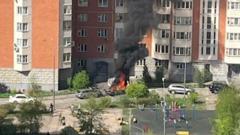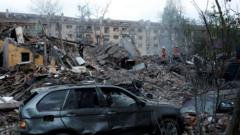In a surprising twist, former President Donald Trump has called for an immediate ceasefire in the ongoing Russia-Ukraine conflict, citing the need for peace negotiations after a particularly deadly assault on Ukraine's capital.
Trump Calls for Immediate Ceasefire Amidst Escalating Violence in Ukraine

Trump Calls for Immediate Ceasefire Amidst Escalating Violence in Ukraine
Former President urges Russia to halt bombings following brutal missile strikes on Kyiv
Former President Donald Trump made an urgent plea to Russian President Vladimir Putin on Thursday, urging him to halt the ongoing bombings of Ukraine and push for a peace agreement. This request follows one of the deadliest attacks on Kyiv in almost a year, emphasizing the urgency of the situation. "Not necessary, and very bad timing. Vladimir, STOP! 5000 soldiers a week are dying. Let’s get the Peace Deal DONE!” Trump expressed via social media. This missile strike by Russia occurred right after the Trump administration threatened to withdraw from peace talks unless Ukraine accepted a peace plan that heavily favored Russia.
Trump's comments are noteworthy given his typical reluctance to criticize Putin during discussions, often directing criticism towards Ukrainian President Volodymyr Zelensky, whom he has labeled as a “dictator” impeding the peace process. While Trump demonstrated a newfound impatience for both parties to reach an agreement, he also seemed to be strategically distancing himself from blame should negotiations fail. This marks a shift from his earlier, more optimistic view of the conflict, which he once claimed could be resolved within "24 hours." Now, he acknowledges the war's complexity, signaling a more cautious approach to his negotiation promises.
Trump's comments are noteworthy given his typical reluctance to criticize Putin during discussions, often directing criticism towards Ukrainian President Volodymyr Zelensky, whom he has labeled as a “dictator” impeding the peace process. While Trump demonstrated a newfound impatience for both parties to reach an agreement, he also seemed to be strategically distancing himself from blame should negotiations fail. This marks a shift from his earlier, more optimistic view of the conflict, which he once claimed could be resolved within "24 hours." Now, he acknowledges the war's complexity, signaling a more cautious approach to his negotiation promises.






















